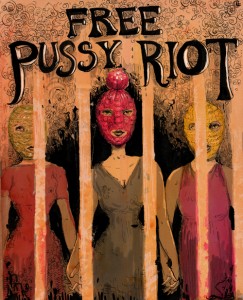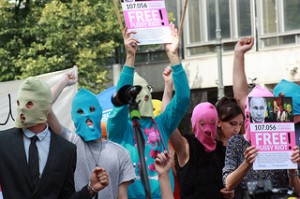Here's a fantastic piece by the equally fantastic Kit O'Connell about the travesty that's the Pussy Riot situation in Russia...
By Kit O'Connell
Image: Molly Crabapple
Of course most people have heard by now that the Russian punk band Pussy Riot were sentenced to 2 years in jail for their guerilla performance of “Punk Prayer” in a Russian Orthodox Cathedral. From Russia Today:
A Moscow court has sentenced three members of Pussy Riot to two years in a medium-security prison for hooliganism motivated by religious hatred and enmity. The six months the girls have spent in pre-trial custody will count as time served. The Judge said Nadezhda Tolokonnikova, Maria Alyokhina and Ekaterina Samutsevich showed flagrant disregard for church parishioners and the fundamentals of the Orthodox faith.Though almost everyone agrees that their charge is too extreme, many people I speak to in the United States object to what they see as the desecration of a sacred space by these young punk women. Let’s look at Pussy Riot and the Two Russias from Common Dreams for some context before we continue:
…
“By their actions, Samutsevich, Tolokonnikova and Alyokhina seriously disrupted public order and the day-to-day running of the Cathedral. They showed blatant disrespect to church-goers and workers, and in doing so gravely offended their religious sensibilities,” Judge Syrova stated announcing the verdict.
The audience met the sentence with sporadic shouts “Shame on the Court!“
The crackdown on Pussy Riot is part of a broader attack on dissent in Russia. In recent weeks, we’ve seen the introduction and rapid passage of a quartet of laws that undermine Russia’s democratic ambitions: (Re-)criminalization of “defamation”; a blacklist of “harmful” websites; punitive fines on participants in “unsanctioned” protests; and a mandate that nonprofits declare foreign funding and brand themselves “foreign agents.” Russia, alas, is not the only country cracking down on political freedom. But these broadly worded, swiftly passed laws represent another wave in Russia’s de-democratization, a process started under Boris Yeltsin and continued under Putin.
…
But lost in much of the coverage is a sobering reality: there are two Russias. The country’s deep divisions are reflected in the polling on Pussy Riot, with only a 43 percent plurality telling pollsters that a potential two-to-seven-year sentence is disproportionate. Why? There’s more in place here than simple offense at their act.
To many Russians, Russia feels like two different countries: one is urban, hyper-Westernized, aggressively modern, and seems condescending in its attitude to ordinary people; the other is the Russian heartland in the regions and provinces, where people are suffering economically and believe they’re guarding the country’s traditional values and religious convictions. This is the lens through which some Russians view Pussy Riot’s imprisonment: not individual freedom of conscience versus the state but national pride and religious faith versus a well-off, urban elite. Putin has masterfully stoked such resentments, framing the resistance to his authority as an affront to the values of the nation (a segment on state TV last month called protests in defense of Pussy Riot a “vanity fair”). Too many Western journalists ignore or underestimate the effectiveness of that appeal.
Politicians that appeal to “traditional” religious values as a way to push their agenda and gain power? Maybe the reason that so many Western journalists ignore this aspect of the story is because it reminds us uncomfortably of our own situation. All around the United States, “religious freedom” is argued as a reason to allow everything from discrimination against gays to rolling back reproductive rights. Women and minorities are treated like chattel or livestock, and all too often the bible is the justification. When the Department of Homeland Security issued a report warning of the danger from right-wing religious extremists, political pressure forced them to rescind it, keeping their focus squarely on practitioners of Islam and peaceful activists.
(Photo: Grüne Bundestagsfraktion / Flickr)
I empathize with those who feel the sanctity of the church should be respected. I think there’s value in creating spaces that are ritualistic and special — I’ve experienced my equivalent at Burning Man events, yet those spaces are also bastions of free speech, debate and self-expression. If Pussy Riot had gone into any small church and disrupted a service without cause, I might feel differently. They didn’t though — they chose to protest at the major symbol of Russian Orthodoxy, and to specifically target the ways in which the religion has become another way for Putin to assert authority over the populace.
If we’re to respect the division between Church and State, what happens when Church becomes a tool of State? Is Church forever a space exempt from disruptive free speech, or does it give up that special privilege at some point? When and how can we object to the ways in which religion disrupts the public order of our lives?
And where do people without religion go to escape the disruptive effects of repressive religious forces? As far as I can tell, there isn’t anywhere. Conservative religious views infect our local, state and national governments. Women’s health plans are gutted in the name of Christ, while so-called Christians look the other way as people starve on the streets. For every group like Faith Action for Women in Need or the Nuns on the Bus, it can seem like there’s a dozen others intent on forcing modern people to accept the most regressive reading possible of their ancient sacred text. Where and when do the rest of us get unfettered free speech and autonomy?
In closing I would just like to say, FREE PUSSY RIOT!


No comments:
Post a Comment